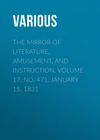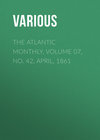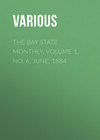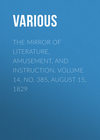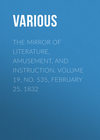Loe raamatut: «Blackwood's Edinburgh Magazine - Volume 62, No. 384, October 1847», lehekülg 14
Fortunately for society and for art, such an unnatural and agitated existence as this could not long endure. Tchartkóff's mental excitement was too violent for his physical strength. A burning fever and furious delirium ravaged his frame, and in a few days he was but the ghost of his former self. The delirium augmented, and became a permanent and incurable mania, in some of whose paroxysms it was necessary to bind him to his couch. He fancied he saw continually before him the singular old portrait from the Stchúkin Dvor! This was the more strange, because since the day he had turned it out of his studio, it had never once met his sight. But now he raved of its terrible living eyes, which haunted him unceasingly, and when this fancy came over him, his madness was something terrific. All the persons who approached his bed he imagined to be horrible portraits; copies, repeated again and again, of the old man with the fiendish eyes. The image multiplied itself perpetually; the ceiling, the walls, the floor, were all covered with portraits, staring sternly and fixedly at him with living eyes. The room extended and stretched out to a vast and interminable gallery, to afford room for millions of repetitions of the ghastly picture. In vain did numerous physicians seek to discover, with a view to the alleviation of the poor wretch's sufferings, some secret connexion between the incidents of his past life and the strange phantom that thus eternally haunted him. No explanation or clue could be obtained from the patient, who continued to apostrophise the portrait in disconnected phrase, and to utter howls of agony and lamentation. At last his existence terminated in one last horrible paroxysm. His corpse was frightful to behold; of his once comely form, a yellow shrivelled skeleton was all that remained. A few thousand rubles were the sole residue of his wealth; and his disappointed heirs, beholding numerous drawers and closets full of torn fragments that had once composed noble pictures, understood and cursed the odious use to which their relative had applied his princely fortune.
CHAPTER II
A number of carriages, caleches, and drójkis were drawn up in the vicinity of a handsome mansion in one of the best quarters of St Petersburg. It had been the residence of a rich virtuoso, lately deceased, and whose pictures, furniture, and curiosities, were now selling by auction. The large drawing-room was filled with the most distinguished amateurs of art in St Petersburg, mingled with brokers and dealers on the look-out for bargains, and with a large sprinkling of those idlers who, without intending to purchase, frequent auctions to kill a morning. The sale was in full activity, and there was eager competition for the lot then up. The biddings succeeded each other so rapidly, that the auctioneer was scarcely able to repeat them. The object so many were eager to possess, was a portrait, which could hardly fail to attract the attention even of persons who know nothing of pictures. This painting, which possessed a very considerable amount of artistical merit, and had apparently been more than once restored, repaired, and cleaned, represented the tawny features of an Oriental, attired in a loose costume. The expression of the face was singular, and by no means pleasant. Its most striking feature was the extraordinary and unaccountable look of the eyes, which, by some trick of the artist, seemed to follow the spectator wherever he went. Every one of the persons there assembled was ready to swear that the eyes looked straight at him; and, what was yet more unaccountable, the effect was the same whether the beholder stood on the right, or on the left, or in front of the picture. This peculiarity it was that had made so many anxious to possess a portrait whose subject and painter were alike unknown. Gradually, however, many of the amateurs ceased their biddings, for the price had become extravagant, and at last only two continued to compete—two rich noblemen, both enthusiastic lovers of the eccentric in art. These still continued the contest, grew heated with their rivalry, and were in a fair way to raise the price to something positively absurd, when a by-stander stepped forward and addressed them. "Before this contest goes farther," he said, "permit me to say a few words. Of all here present, it is I, I believe, who have the best right to the portrait in dispute."
All eyes were turned towards the speaker. He was a tall, handsome man, of about thirty-five, with a pleasant, cheerful countenance, a careless style of dress, and long black curls flowing down his neck. He was personally known to many present, and the name of B——, the artist, was circulated through the room.
"Extraordinary as my words may appear to you," he resumed, perceiving he had fixed the general attention, "I can explain them if you are disposed to give me five minutes' audience. I have every reason to believe that this portrait is one I have long sought in vain."
Curiosity was expressed on every countenance; the auctioneer stood open-mouthed and with uplifted hammer; all entreated B—— to tell his tale. The artist at once complied.
"You are all acquainted," he said, "with the quarter of St Petersburg known as the Kolómna, and aware that it is chiefly occupied by persons either in poverty, or whose resources are exceedingly limited, many of whom, compelled by unforeseen circumstances to outstrip their limited income, frequently find themselves in want of immediate and temporary assistance; compelled, in short, to apply to money-lenders. In consequence of this, there has settled amongst them a particular class of usurers, who supply petty sums on satisfactory pledges, and at enormous interest. These pawnbrokers on a small scale are generally far more pitiless than the aristocratic usurer, whose customers drive to his door in their carriages. Compunction, humanity, a feeling of pity for the unfortunates upon whose need they fatten, never by any chance enter their breast. Amongst these callous extortioners there was one who, at a certain period of the last century, under the reign of the Empress Catherine II., had been settled for some years in the Kolómna. He was an extraordinary and enigmatical personage, of whom none knew any thing; he wore a flowing Asiatic dress, his complexion was swarthy as an Arab; but to what nation he really belonged, whether Hindoo, or Greek, or Persian, none could decide. His tall stature, his tawny, withered, wiry face, with its tint of greenish bronze, his large eyes full of sullen fire, shadowed by thick and overhanging brows; every point in his appearance, in short, made a strong and marked distinction between him and the other inhabitants of the quarter. His very dwelling was quite unlike the little wooden houses which surrounded it. It was a large brick building, in the style of those often constructed by the Genoese merchants, with windows of different sizes disposed at irregular distances, with iron shutters and hasps. This usurer was distinguished from all others by the circumstance that he could always supply any sum of money required, and would accommodate alike the needy groom and the extravagant noble. At his door were often to be seen brilliant equipages, through whose windows might sometimes be discerned the head of a luxurious and fashionable lady. Rumour said that his iron chests teemed with countless heaps of money, plate, diamonds, and all kinds of valuable pledges, but nevertheless he was reported less greedy than the other money-lenders. He made no difficulty, people said, to lend, and was apparently far from oppressive in fixing the terms of payment. But on the day of reckoning, it was observed, that by some extraordinary arithmetical calculation, he made the interest mount up to an enormous sum: such, at least, was the popular report. The strangest thing about him, however, and which struck every body, was the fatality that seemed to attach to his loans; all who borrowed of him finished their lives in an unhappy manner. Whether this was a mere popular notion, a stupid superstitious gossip, or a rumour intentionally disseminated, has ever remained a mystery. But it is a fact that many things occurred to give it validity, and that within a comparatively short period of time. Amongst the aristocracy of the day, there was one young man who particularly attracted the attention of society. He was of ancient descent and noble blood; had very early distinguished himself in the service of the empire, as a warm protector of every thing honourable and elevated, and as a passionate lover of art and genius. He was soon distinguished by the personal notice of the Empress, who confided to him the duties of an office peculiarly adapted to his tastes and talents—an office which gave him power to be of the greatest service not only to science, but to humanity itself. The young noble surrounded himself with artists, poets, scholars, and men of learning. To all of them he promised employment, patronage, protection. He undertook, at his own expense, a number of important publications, gave a multitude of orders to artists, founded prizes for excellence, spent enormous sums in this unselfish manner, and at length got into difficulties. Full, however, of generous enthusiasm, and unwilling to leave his work half finished, he borrowed money in all directions, and at length found his way to the famous usurer in the Kolómna. Having obtained from this man a very extensive loan, the young noble all at once underwent a complete transformation. He became, as by enchantment, the enemy of rising intellect and talent, the persecutor of all he had previously protected. It was just then that the French Revolution broke out. This event gave him a handle for suspicion. In every thing he detected some revolutionary tendency; in every word, in every expressed opinion, he saw a dangerous hint or perfidious insinuation. The disease gained on him till he almost began to suspect himself. He laid false informations, fabricated the foulest charges, and caused the ruin of numbers of innocent people. At first, his guilty manœuvres were undetected, and, when found out, they were thought to proceed from insanity. Report was made to the Empress, who deprived him of his office. But his severest sentence was the contempt he read in the faces of his countrymen. I need not describe the sufferings of this vain and insolent spirit, the tortures he endured from crushed pride, defeated ambition, ruined expectations. At last his monomania—for such it must surely have been—aggravated by regret and chagrin, became insanity, and in a frightful paroxysm the unhappy maniac committed suicide.
"Not less remarkable than the fate of this wretched young man was that of a lady who passed at that time for the most beautiful woman in St Petersburg. My father has often assured me, that he never beheld any thing to be compared to her. Possessing, besides her beauty, the not less fascinating charms of wit, intellect, wealth, and high rank, she was of course surrounded by a swarm of admirers. The most remarkable of these was Prince R., the flower of all the young nobles of that day, and to whom the palm was universally conceded, not only for beauty of person, but for high qualities and chivalry of character. He was well qualified for a hero of romance, or a woman's beau-ideal. Deeply and passionately enamoured of the young countess, his affection met with as pure and ardent a return. But her relations disapproved the match. The prince's paternal estates had passed out of his hands,—his family was in disgrace at court, and the derangement of his finances was no secret to any body. Suddenly he left the capital, apparently for the purpose of putting his affairs in order; and, after a brief absence, reappeared and commenced a life of splendid extravagance. His balls and entertainments were so magnificent as to attract the notice of the court, and, it was rumoured, to mollify imperial displeasure. The countess's father became suddenly gracious, and soon nothing was talked of in St Petersburg but the marriage of the two lovers. Of the origin of the enormous fortune of the bridegroom, to which this change in the sentiments of his future father-in-law was unquestionably to be attributed, nobody could give a distinct account, though it was pretty generally whispered that he had entered into a compact with the mysterious money-lender of the Kolómna, and from him obtained a large loan. Be this as it may, the wedding formed the whole talk of the town. Bride and bridegroom were the object of universal envy. Every body had heard of their beauty and virtues, of their ardent and constant love; and all rejoiced that the obstacles to their union were removed. Numerous were the prophetic pictures drawn of the blissful existence the young couple were certain to enjoy. The event proved very different. In one twelvemonth a total and terrible change took place in the character of the prince. Hitherto noble, generous, and confiding, he became, on a sudden, jealous, suspicious, impatient, and capricious. He was the tyrant and tormentor of his wife; and, to the unbounded astonishment of every body who had known him before his marriage, treated her with inhuman brutality, and was even known to strike her! In one year the beautiful and dazzling girl, who was followed by a crowd of obedient adorers, could not be recognised in the careworn and unhappy wife. At length, unable longer to support the cruel yoke of such a marriage, she sought a separation. At the first notification of this step, the prince gave way to the most uncontrolled fury,—burst into her chamber, and would infallibly have stabbed her, had he not been seized and removed by force. Mad with rage, he turned his weapon upon himself, and lay a corpse at the feet of his horror-stricken friends. Besides these two incidents, which attracted great notice in the higher circles, a number of other instances were cited as having occurred amongst the lower classes, where the loans of the mysterious usurer had brought misfortune in their train. One man, previously a sober and honest artisan, had become a confirmed drunkard, and died in the hospital; a shopman had robbed his master; an izvóztchik, for years noted for his honesty, had cut the throat of a customer in order to rob him of an insignificant sum. All these persons, and many others, who sank into misery and crime, or perished by violent deaths, had been customers of the mysterious Asiatic, of whom these stories, related, as they often were, with additions and exaggerations, inspired the quiet and peaceable inhabitants of the Kolómna with an involuntary horror. Nobody doubted the real presence of the evil spirit in this man. They said that he exacted conditions which made one's very hair stand on end, and which none of his unhappy clients dared disclose; that his money had a mysterious property of attraction; that the coins were marked with strange characters, and grew red-hot of their own accord. In short, there were a thousand extravagant reports. But what is most remarkable is, that this population of Kolómna, made up of pensioners, half-pay officers, petty functionaries, obscure artists, and others equally necessitous, preferred bearing the utmost distress to having recourse to the dreaded money-lender. They all declared they would rather mortify their bodies than destroy their souls. Those who met him in the street hurried by with an uneasy sensation, making way for him with anxious submissiveness, and looking long over their shoulders at the tall lean figure as it lost itself in the distance. His singular frame might well have been the receptacle of a supernatural and unholy spirit. The wild and deeply-cut features had something different from humanity; the extraordinary thickness of the shaggy eyebrows; the bronzed glow of the countenance; the frightful eyes, with their steady unsupportable glare; even the broad folds of the Oriental dress were, each in turn, the subject of uneasy and suspicious comment. My father told me, that when he met him he could not avoid stopping to gaze at him; and it invariably occurred to him that he had never seen, either in painting or life, a face that so completely came up to his notion of a demon. But I must make you, as briefly as possible, acquainted with my father, who is the real hero of my tale. He was a remarkable man, a self-taught painter, seeking principles in his own mind, and elaborating, without master or school, rules and laws of art, led onward by the mere thirst for excellence, and advancing, under the influence of causes which he himself, perhaps, could not have defined, along a path marked out for him only in his own mind. He was one of those children of genius whom contemporaries so often stigmatise as ignorant, because they have struck out a track for themselves, and whose ardour is to be chilled neither by censure nor failures; whence, on the contrary, they derive fresh vigour and courage. Aided only by his own lofty instincts, he attained to the true understanding of what historical painting should be. Scriptural subjects, the last and loftiest step of high art, chiefly occupied his pencil. Free from the feverish irritable vanity and paltry envy so common amongst artists, he was a firm, upright, honourable man, a little rough and unpolished in externals—the husk rather rugged—and with a share of honest pride and independent feeling which sometimes imparted to his manner an air of mingled bluntness and condescension. 'I care nothing for your fine folks,' he would say. 'I don't work for them. I don't paint drawing-room pictures. Those who understand my work best reward me for it. I do not blame fashionable people for not understanding art: how should they? They understand their cards; they are judges of wine and horses. 'Tis enough. When they do pick up a crude notion or two on the subject of painting, they become intolerable by their assumption. I prefer, a thousand times, the man who honestly confesses he knows nothing about art, to your ignoramus who comes in with a solemn affectation of connoisseurship, claiming to be a judge, talking about things he does not understand, and consequently talking nonsense.' By no means a covetous man, my father painted for very modest remuneration, contented to earn sufficient for the support of his family, and for providing the means of exercising his art. Generous in the extreme, his hand was ever open to less successful artists. Imbued with a fervent and profound sense of religion, it was that, perhaps, which enabled him to communicate to the faces he painted an elevation of religious sentiment that the most brilliant pencils often fall to give. In course of time, and aided by obstinate industry and unflinching perseverance, his talent attracted the attention and commanded the respect even of those who had at first sneered at him as a home-made artist. He received numerous orders for altar-pieces and other church pictures, and laboured incessantly. One picture, in particular, engaged his closest attention. The subject I forget, but I know that the great enemy of mankind was to be introduced. Long did my father meditate on this figure; he desired to embody in the countenance the expression of every evil passion that afflicts fallen humanity. Whilst reflecting on the subject, and conjuring up horrible countenances in his imagination, the strange features of the mysterious money-lender frequently recurred to him; and, as often as they did so, he said to himself, 'The usurer would be a fine model for my Devil.' One day, whilst he was busy planning his great work, and making sketches, with which he had difficulty in pleasing himself, there was a knock at his studio door, and the next instant, to his infinite astonishment, the usurer entered the room. My father has since told me that on beholding him he felt an inexplicable chill and shudder come over his whole frame.
"'You are an artist?' said the intruder, abruptly.
"'I am,' replied my father, and wondered what was coming next.
"'I want my portrait painted. I have not long to live. I have no children, and I do not wish to die altogether. Can you paint a portrait of me that shall be exactly like life?"
"My father reflected for a moment. 'Nothing could be more opportune,' thought he to himself; 'he comes of his own accord to sit to me for my Devil.' And he at once agreed to satisfy his singular visitor. Hour and price were stipulated, and the next day, my father, bearing palette and brushes, repaired to the abode of his new sitter. The gloomy court-yard, surrounded by high walls; the watch-dogs; the iron doors and shutters; the arched windows; the huge coffers, covered with strange, outlandish-looking carpets; and, above all, the grim, gloomy visage of the master of the house, seated immoveable before him,—all these conspired to produce a strong impression on his mind. The windows were closed and darkened; a single pane in the upper part of one of them admitted a strong ray of light. My father forgot the strange repute of his sitter in zeal for his art. 'How splendidly the fellow's face is lighted up!' he thought to himself, and set to work with furious eagerness, as though fearful of losing the favourable moment. 'What vigour! what light and shade!' he exclaimed, inaudibly. 'If I can get him in only half as vigorously as he sits there, the portrait will beat every thing I have done: he will walk out of the canvass. What extraordinary features; what depth in the lines and furrows! he repeated to himself, redoubling his fervour at every stroke, as he observed trait after trait rapidly transferring itself to the canvass. But, whilst proceeding with his work, he insensibly became aware of a strange feeling of oppression and uneasiness that crept over him, he knew not how or wherefore. Disregarding it, he persisted in following, with the strictest fidelity and most scrupulous care, every line, and tone, and shade in the extraordinary countenance of his model. To the eyes he gave his chief attention. At first they nearly made him despair. So peculiar and penetrating was their expression, so unlike were they to any eyes he had ever encountered, that it seemed an almost hopeless task to attempt to render them in a picture. Nevertheless he persevered, resolved, at whatever cost of pains and time, to follow them in their minute details, and thus to penetrate, if possible, the mystery and secret of their expression. But whilst engaged in this work, whilst diving, as it were, with his pencil, into the recesses of those mysterious orbs, the uneasiness he had before felt rapidly increased, and there arose in his soul such an inexplicable loathing, such an overpowering sensation of vague horror, that he was several times obliged to suspend his work, and it was only by a violent effort he could bring himself to resume it. At last this unaccountable feeling fairly mastered him; he could no longer bear to look upon those horrible eyes, whose demon-like gaze filled him with dismay. He closed the sitting. But the next day, and the one after that, the same thing occurred; after painting for a short time he invariably became agitated, excited, and unable to proceed. Each day these sensations increased in strength, until they became positive torture, and at last my father threw down his brush, declaring he would paint no more. Extraordinary was the effect produced upon the mysterious usurer by this declaration. By the most touching and humble entreaties, and by promises of munificent reward, he essayed, but in vain, to induce my father to retract his decision and resume his task. He even prostrated himself before him and implored him to terminate the picture, saying that upon its completion hung his fate, and his very existence. And then he threw out dark and confused hints of supernatural agency, by which, if his living features were once faithfully represented, his soul would be in some sort transferred to the portrait, and be saved from complete annihilation, or a yet worse doom. Terror-stricken at these strange and fearful words, my father threw down pencil and palette and rushed from the house. He could not sleep that night for meditating on this occurrence. The next morning he received back the unfinished portrait, brought to his house by an old woman, the only human being who lived with the usurer. She left also a message, that her master returned the portrait, because he did not want and would not pay for it. A few hours afterwards, on going out, my father learned that the usurer of the Kolómna had died that morning. There was a mystery in all this which my father neither was able nor desired to solve.
"Dating from that day, a perceptible and unfavourable change took place in my father's character. Without apparent cause he became irritable, restless, and unhappy, and a very short time elapsed before he became guilty of an act of which none supposed him capable. About this period, the works of one of his pupils had attracted the attention of a small circle of judges and amateurs of art. My father from the first had perceived and appreciated this young man's talent, and had shown himself particularly well-disposed towards him. Suddenly, as if by a spell, envy and hatred were generated in his mind. The general interest excited by the pupil became intolerable to the master, who could not hear with patience the name of the rising genius. At length, to fill up the measure of his mortification, he learned that the young man had been preferred to paint a picture for a splendid church then just completed. This drove my father frantic. Previously the most upright and honourable of men, he now condescended to the pettiest intrigues and manœuvres—he who, up to that time, had regarded with horror and contempt all that bore the semblance of intrigue. By dint of caballing, he succeeded in obtaining an open competition for the work in question; whoever chose, was at liberty to send in his picture, and the best would obtain the preference. Having brought this about, he secluded himself in his studio and applied himself to the task with intense ardour, summoning up all his great energy, skill, and experience of art. As was to be expected, the result was one of his very finest pictures. As a work of art, it was unquestionably the best. When my father saw it placed beside those of the other competitors, a smile of triumph curled his lip, and he entertained no doubt that his would be the picture chosen to adorn the altar. The committee appointed to decide arrived, and cast approving glances at my father's painting. Before giving their verdict, however, they proceeded to examine it minutely, and at last, one of the members—an ecclesiastic of high rank, if I remember rightly—waved his hand to secure the attention of his fellow-judges, and spoke thus: 'The picture presented by this artist,' he said, 'has undoubtedly very high merit as a mere work of art; but it is unsuited to the place and purpose for which it was designed. Those countenances have nothing sacred or holy in their expression. On the contrary, you may discern in every one of them, and especially in the eyes, the traces, more or less modified, of some evil passion, a something unhallowed and almost fiendish.' Struck by this observation, all present looked at the picture: it was impossible to deny the justice of the criticism. My father rushed furiously forward eager to deny and disprove the unfavourable judgment. But he saw for the first time, with feelings of intense horror, that he had given to almost all his countenances the eyes of the money-lender. They all looked out of the canvass with such a devilish and abominable stare, that he himself could scarcely help shuddering. The picture was rejected, and, with unspeakable rage and envy, he heard the prize awarded to his former pupil. He returned home in a state of mind worthy of a demon. He abused and even ill-treated my poor mother, who sought to console him for his disappointment, drove his children brutally from him, broke his easel and brushes, tore down from the wall the portrait of the money-lender, called for a knife, and ordered a fire to be instantly lighted, intending to cut up the picture and burn it. In this mood he was found by a friend, a painter like himself, a careless, jovial dog, always in good-humour, untroubled with ambition, working gaily at whatever he could get to do, and loving a good dinner and merry company.
"'What the deuce are you at? what are you about to burn?' said he, going up to the portrait. 'Why, are you mad? This is one of your very best pictures! The old money-lender, I declare. By Jove! an exquisite thing! Admirably hit off! you have caught the old fellow's eyes to perfection. One would almost swear you had transplanted them from the head to the picture. They look out of the canvass.'
"'We'll see how they look in the fire,' said my father surlily, making a movement to thrust the picture into the grate.
"'Stop, stop!' cried his friend, checking his arm. 'Give it me, rather than burn it.' My father was at first unwilling, but at last consented; and the jolly old painter, enchanted with his acquisition, carried off the portrait.
"The picture gone, my father felt himself more tranquil. 'It seemed,' he said, 'as if its departure had taken a load off his heart.' He was astonished at his recent conduct, at the malice and envy that had filled his soul. The more he reflected, the stronger became his sorrow and repentance. 'Yes,' he at last exclaimed, with sincere self-reproach, 'God has punished me for my sins; my picture was really a shameful and abominable thing. It was inspired by the wicked hope of injuring a fellow-man, and a brother artist. Hatred and envy guided my pencil; what better feelings could I expect it to portray?' Without a moment's delay he went in search of his former pupil, embraced him affectionately, entreated his forgiveness, and did all in his power to efface from the young man's mind the remembrance of his offence. Once more his days glided on in peaceful and contented toll, although his face had assumed a pensive and melancholy expression, previously a stranger to it. He prayed more frequently and fervently, was more often silent, and spoke less bluntly and roughly to others; the rugged suffice of his character was smoothed and softened.













